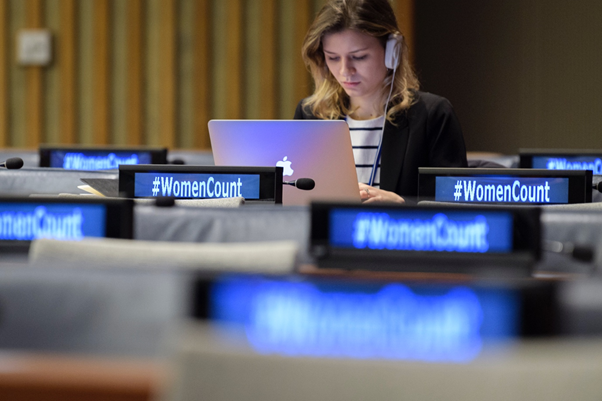For a long period, many countries had formal restrictions to women in their diplomatic service. It was only in the 1970s that countries like Sweden, the UK and the United States lifted the marriage ban, which required women to choose between a marriage and a foreign service career. Since then, women have come a long way, but they continue to be marginalized in the forums that deal with international security issues, for example, at the annual meeting of the UN General Assembly’s First Committee.
The gender gap is even wider at the leadership levels, as attested by the so-called law of increasing disproportion, according to which the proportion of women drops for every upward step on the status ladder. This became evident during the General Assembly’s 2021 high-level segment: out of 191 leaders that addressed the forum, only 18 were women.
In view of this gender disparity, statements calling for “full and equal participation” are increasingly common in the First Committee. This is a welcome development. But it is also important to go beyond catch phrases, take stock and reflect about women in arms control and disarmament diplomacy.
In 2019, UNIDIR published a study called Still Behind the Curve. Surveying more than 80 multilateral meetings on arms control and disarmament, spanning four decades, the report presents patterns and trends on gender balance in forums dealing with weapons.
-
Women comprise only a third of diplomats accredited to arms control and disarmament forums.
-
In smaller, more specialized forums, the average proportion of women drops to twenty percent.
-
The correlation between group size and gender composition may be explained by the fact that when States can only send a single representative, they almost always send a man. Women are typically included as the second or, more often, third or fourth member of their respective delegations.
-
When it comes to leadership positions, gender imbalance is even more pronounced. Men are overrepresented as heads of delegations to the First Committee, the NPT and the Conference on Disarmament, to an even greater degree than would be expected given the overall proportion of men in a meeting. In 2018, for instance, 76 per cent of heads of delegations at those meetings were men – above the 66 per cent overall proportion of men delegates.
To put these numbers in context, one has to look at the institutional culture of arms control and disarmament diplomacy. As part of its research, UNIDIR conducted focus group discussions with diplomats in New York, Vienna and Geneva. In total, 50 individuals attended the discussions, including diplomats from 28 Member States, professionals from five international organizations, and four representatives of civil society and academia.
During those meetings, participants shared their perception that arms control and disarmament as a field has rewarded characteristics, expertise, and experience that are more commonly associated with men such as toughness, seriousness, risk-taking, and military training. This has made it more difficult for women to pursue a career in this field.
The ideas about who and what makes “good” policy seem very much linked with masculinized norms. This can alienate diversity, and prevent innovation from happening. And innovation is precisely what the field needs more of now.
Women, as well as men, have the right to participate in international security discussions and shape the outcomes of decisions that will affect their lives. Moreover, studies have indicated that diverse teams tend to be more innovative and effective in anticipating problems and finding sustainable solutions.
As new challenges threaten the international security architecture, women’s continued marginalization in negotiations related to arms control and disarmament is a loss for the entire world. As Secretary-General António Guterres stated in his Agenda for Disarmament, involving more women can revitalize talks and advance our collective effort to create a safer and more secure future.
It should be noted that this is not a new idea. In 2000, the UN Security Council approved resolution 1325 on Women, Peace and Security, which called for increased participation of women in formal peace negotiations, in the military, in peacekeeping, in post-conflict governance bodies and in all centers of power where decisions are made. But twenty years later, women are still underrepresented in the First Committee and in other forums that deal with international security. We must change this now.
What can be done to improve women’s participation and promote gender equality in international security?
1. Promoting gender perspectives in First Committee resolutions
There has been a significant increase in the number of First Committee resolutions that acknowledge and address the gender equality and international security nexus. Over the past four years, this number has doubled, going from nine in 2016 to 18 resolutions in 2020.
As gender mainstreaming in international security gains momentum, there is an opportunity to expand attention to the incorporation of gender perspectives into the work of the First Committee. Going beyond cursory references in the preamble and including operational commitments in the resolutions, e.g. mandating the collection of sex- and age-disaggregated data on the impact of armed violence, gender-based violence and conflict. First Committee resolutions could be instrumental to strengthening gender equality mandates throughout the work of the United Nations and its Member States.
2. Making multilateral meetings more inclusive
Together with Ireland and Namibia, UNIDIR is a co-chair of the International Gender Champions Disarmament Impact Group. This initiative seeks to promote dialogue, shared knowledge and the pursuit of concrete opportunities to advance gender-responsive action within multilateral disarmament processes.
The Impact Group published a Resource Pack on Gender and Disarmament, with information that can support diplomats in applying a gender lens to their work and offer practical guidance to improve multilateral meetings, including the UN General Assembly and its Main Committees.
States Parties can include gender criteria in the sponsorship program for delegations; and they can request the secretariat to collect, track, and publish sex-disaggregated data and statistics on gender balance in delegations, bodies, and panels.
States Parties could agree on including gender as a criterion when electing presidents or chairpersons. This would help ensure a gender-balanced organization, featuring both women and men at the highest level.
3. Encouraging diplomats to develop gender expertise
A gender analysis examines the relationships between women, men, girls and boys, including their access to and control of resources and the constraints they face relative to each other. This type of analysis can be integrated into policy development, implementation and review, so as to ensure that different needs are equally addressed, and that greater equality and justice in gender relations are promoted.
With regards to international security issues, a gender analysis can be usefully applied to understand how socially constructed attributes, opportunities, and relationships associated with a gender identity may affect issues, such as the likelihood of being targeted by weapons systems, prospects of becoming a victim/survivor of armed violence, the ability to access medical attention in the aftermath of armed conflict, and the long-lasting biological and physiological impacts of weapons on individuals.
Diplomats should be equipped with the relevant knowledge and tools that can allow them to consider and respond to the gendered dimensions of international security problems. From the many disciplines covered in diplomatic trainings, gender studies are strikingly absent. To make diplomatic action more effective, it is important to change that and build up gender expertise within foreign services.
Promoting gender perspectives in First Committee resolutions, making multilateral meetings more inclusive, and encouraging diplomats to develop gender expertise would help overcome fragmentation and ensure further integration between gender equality and other multilateral agendas. As such, they would represent an important step towards the implementation of Our Common Agenda, an agenda of action launched by the Secretary-General to strengthen and accelerate multilateral agreements and make a tangible difference in people’s lives. As the Secretary-General has said, “our world needs more, and better, multilateralism, based on deeper solidarity, to deal with the crises we face, and to reverse today’s dangerous trends”. This will not happen if 50% of the population are excluded from discussions about our collective future.
_______________________________________________________________________________________________________________
Renata is the Programme Lead for Gender and Disarmament at the United Nations Institute for Disarmament Research (UNIDIR). She holds a PhD in History and Politics from the Vargas Foundation, Brazil, and a master’s in International Politics and Security from University College London, UK.

